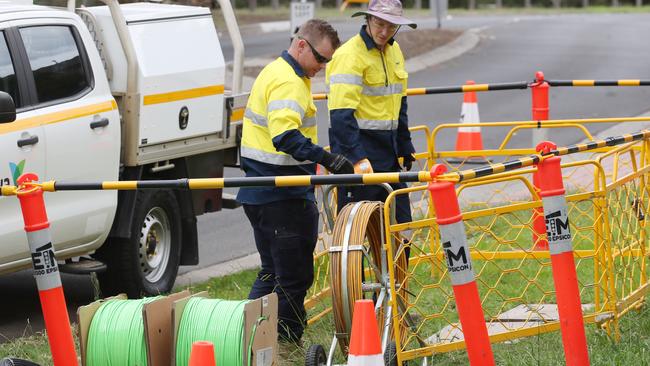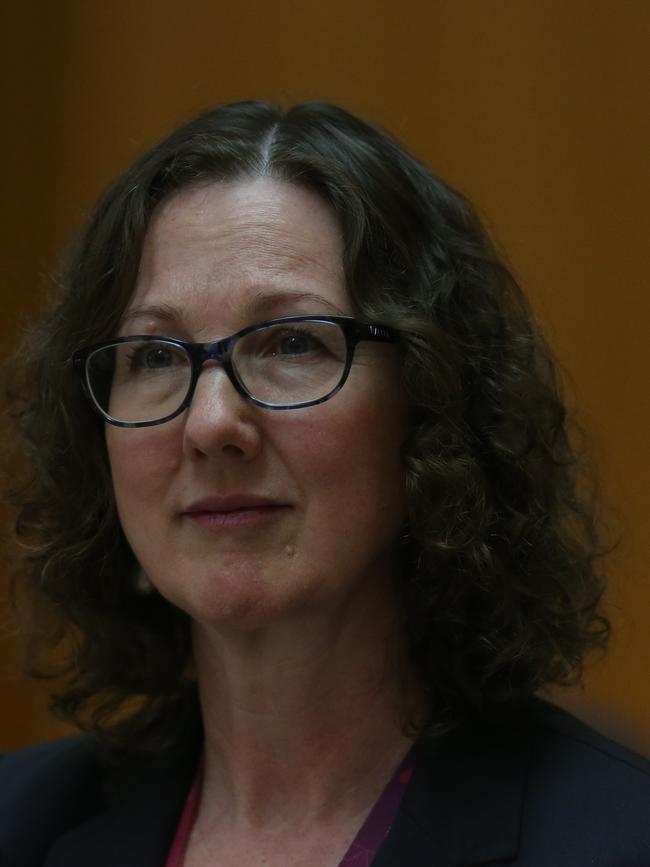Telstra, Optus and TPG welcome NBN Co’s decision to backtrack on planned price rises
The company says changes in the ‘policy landscape’ mean it will now axe its controversial charging model but that will not ‘come without cost’.
Business
Don't miss out on the headlines from Business. Followed categories will be added to My News.
The nation’s largest telecommunications operators – Telstra, Optus and TPG – have cautiously welcomed a decision by NBN Co to call off proposed price rises.
Internet access prices are set to ease following a submission on Friday to the competition and consumer regulator, in which NBN Co said it would also axe a charge that services providers pay to cover the amount of bandwidth they provide to their customers.
Known as the CVC charge, the levy has long been criticised by retailers, who instead want to play a flat wholesale price per service.
In its previous submission – known as a Special Access Undertaking – made to the Australian Competition and Consumer Commission in March, NBN Co had wanted to lock in price rises until 2040, and double the price of entry-tier plans over the decade.
That plan provoked an angry response from telcos and the ACCC, and led Communications Minister Michelle Rowland to call for a reappraisal of the proposal.
The new proposals have been welcomed by broadband providers. NBN Co said on Friday that its new plan “materially improve the March variation” to respond to the providers’ and the ACCC’s concerns, but those changes “do not come without cost”.

“The pricing changes that NBN proposes to include in the updated SAU variation materially reduce NBN’s revenues in the short-term, materially reduce NBN’s ability to monetise the increased usage of the network that will inevitably take place over coming decades, and significantly reduce the level of regulatory certainty delivered to NBN by the SAU,” the company said in its discussion paper.
“NBN has carefully considered the various expectations and constraints placed on it, including achieving and maintaining a stand-alone investment grade credit rating, likely future network investments, the impact of competitive networks and the policy expectations of government,” the paper reads.
“NBN is seeking to balance retailer and ACCC feedback while framing an SAU that also provides NBN with the opportunity to sustainably generate the necessary revenues to service its debts, operate efficiently and efficiently invest into the future to meet the needs of Australians for a faster, more reliable and more capable and resilient network.”
A spokesman for the ACCC said regulator would continue its engagement with NBN Co and the industry next week.
“When we receive a revised SAU variation proposal from NBN Co, we will publish and consult on it. We will then decide whether to accept it in accordance with the criteria set out in the Competition and Consumer Act,” the spokesman said.
Andrew Sheridan, Optus’ vice president for regulatory and public affairs, said he welcomed the reset. “While there is a lot of detail to review, the signposts provide reassurance that we are heading in the right direction,” he said.
A TPG spokesman called the move to axe CVC pricing “long overdue,” but criticised its processes. “There continues to be a lack of accountability within the NBN for the significant time, effort and expense wasted across industry over the past 14 months to address the failings of the previous SAU proposal,” he said.
Michelle Lim, chair of challenger telco alliance Commpete, said NBN Co’s previous submission was inadequate.
“The NBN was originally intended to level the playing field and open up opportunities for both large and small providers to deliver retail market competition, which includes service quality and performance, price competitiveness, and overall customer experience which benchmark with international standards,” she said.
NBN Co chief executive Stephen Rue on Friday said the policy landscape had changed since the company lodged its original proposal in March.
“We are suggesting further changes to the SAU over and above the significant changes we had already proposed and in the context of delivering government policy,” he said.

“We are proposing further reductions in wholesale pricing while also seeking to ensure we remain financially resourced to invest in upgrades to the network for both speed and reliability. We need to maintain our ability to repay government and private debt and ensure we remain capable of achieving a stand-alone investment grade rating, without requiring any additional government funding beyond existing commitments.”
Mr Rue said that the company has attempted to strike a balance of providing growing broadband access needs of end consumers at a fair price over the long term.
“We appreciate that retailers want price certainty, and this proposal provides for that. We believe that it is in the entire industry’s best interests that we build shared capabilities around a strong, competitive and continuously improving NBN network with an excellent customer experience,” he said. “The comprehensive and significant changes presented in our (discussion paper) would fundamentally change the way NBN is regulated and demonstrates our commitment to enable the delivery of high-speed, high-value services to customers.”
NBN Co’s top five retail service providers including Aussie Broadband, Optus, TPG, Vocus and Telstra have previously asked the ACCC to intervene and set prices for NBN services, after they collectively lost patience with NBN Co to come up with an agreeable pricing model.
NBN Co’s chief legal and regulatory officer Jane van Beelen said in an interview on Friday that ACCC regulated prices would not be in the best interests of competition, end consumers or the NBN.

“We operate in a competitive market, and so we have to think all the time about how we’re going to best enable customers to make the most of the NBN, how are we going to get more customers on the NBN and avoid losing customers to competitive infrastructures such as wireless and competing fibre networks,” she said. “The other thing is that we all want regulatory certainty, and pricing certainty, and the best way to get that is through having an accepted SAU because it provides that long term certainty, not only what the prices are today, but it constrains the ability for the prices to go up over time. So if the ACCC were to set prices, then that would be a process that has to be repeated periodically, and it would continue to be the subject of much advocacy and angst.
“The telco industry went through a lot of that advocacy and angst back in the ‘90s, and it is not a recipe for a stable environment,” Ms van Beelen told The Weekend Australian on Friday.
More Coverage
Originally published as Telstra, Optus and TPG welcome NBN Co’s decision to backtrack on planned price rises





